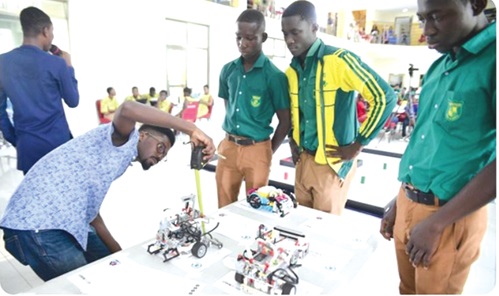The Fourth Industrial Revolution is being driven not by steam or electricity, but by data and intelligent machines.
Just as the first industrial revolution mechanised labour and transformed economies through mass production (Schwab, 2016), the next frontier in Africa’s healthcare transformation lies in artificial intelligence (AI), machine learning (ML) and robotics.
For Ghana to meet the growing health demands of its population, particularly amid limited personnel and infrastructure, it must build a future-ready workforce equipped with the tools of intelligent automation.
I discuss the imperative of embedding machine learning and robotics education as foundational pillars within Ghana’s educational system to drive sustainable and equitable healthcare innovation across the continent.
Historical context
The global economic shift brought about by the Industrial Revolution underscores the transformative power of mechanisation. Countries that invested early in mechanical engineering and manufacturing became global leaders.
Africa, however, was largely excluded from this early wave, and as a result, still grapples with underdeveloped industries and limited technological infrastructure (Acemoglu & Robinson, 2012).
Today, a new revolution is underway, one that centres on algorithms, automation and data. Machine learning enables systems to improve over time with experience, while robotics integrates this intelligence into physical tools.
These technologies, already redefining fields like finance and logistics, are rapidly proving critical in healthcare, from surgical robotics to AI-assisted diagnostics (Topol, 2019).
Africa has the opportunity to leapfrog traditional development constraints if it anchors its education system in these emerging disciplines.
Case, healthcare transformation
Ghana’s healthcare system faces pressing challenges: a high disease burden, a shortage of healthcare professionals and uneven access to quality services (WHO, 2023).
These issues are exacerbated in rural areas, where doctor-to-patient ratios are alarmingly low.
Machine learning can revolutionise diagnostics by enabling early detection of diseases such as cervical cancer and diabetic retinopathy using image-based models (Esteva et al., 2017).
Similarly, AI chatbots and robotic systems can extend healthcare reach by supporting triage, medication adherence and mental health care.
For example, in Rwanda, drone delivery systems powered by AI are already being used to distribute blood and vaccines to remote clinics (Mutabazi, 2020).
Ghana can adopt and scale such innovations, but only if its human capital is equipped with the technical expertise to build, manage and adapt these systems.
Education, catalyst
Embedding machine learning and robotics into the national curriculum, starting from the basic to tertiary level, is critical.
Just as the West built vocational and technical institutions to support the industrial revolution, Ghana must develop centres of excellence in AI, data science and health robotics.
This includes:
• Curriculum reform to integrate computational thinking, algorithmic logic and biomedical robotics.
• Technical laboratories where students learn by building functional robotic arms, wearable sensors or diagnostic tools.
• Industry-academia partnerships to provide internships, mentorships and real-world projects, especially in hospitals and telehealth settings.
Countries like India have seen a surge in tech-driven healthcare solutions due to early investments in STEM education and startup ecosystems. Ghana must follow suit if it intends to lead Africa in smart healthcare delivery (NASSCOM, 2020).
Implications
Beyond clinical benefits, the adoption of machine learning and robotics in healthcare can spur job creation in software development, mechatronics and data science.
A healthcare engineer trained in Ghana can design solutions that are culturally and economically appropriate, such as low-cost robotic prosthetics or diagnostic kiosks powered by ML.
However, ethical considerations must also be addressed, including data privacy, bias in AI models and equitable access to technologies.
Integrating ethics and humanities in STEM education ensures that innovation is guided by compassion and inclusivity.
Recommendations
The next big transformation in Ghana and indeed Africa’s healthcare sector will not come solely from more hospitals or drugs.
It will come from intelligent systems powered by machine learning and robotics.
To harness this potential, education must be the foundation.
The Government of Ghana, academic institutions and development partners should prioritise:
• National AI and robotics curriculum frameworks
• Investments in teacher training and lab infrastructure
• Funding incentives for student-led innovation in health tech
• Public-private partnerships to drive applied research and deployment
By doing so, Ghana will not only transform its healthcare sector but also become a continental leader in tech-driven health innovation.
The writer is with the Department of Biomedical Engineering,
University of Ghana – Legon.
E-mail: teteyenyor@yahoo.com

